Energy for the Future: Sustainability Challenges and Perspectives

The Symposium on “Sustainable Energy Systems”, part of the 6th Doctoral Congress in Engineering (DCE25), will take place at FEUP, Porto, Portugal, on June 30th and July 1st 2025.
The Sustainable Energy Systems Doctoral Program (PDSSE) is a four-year program that brings together the Departments of Mechanical, Electrical and Computer Engineering from various Portuguese institutions, including FEUP, ISEG, IST, and the University of Coimbra. Designed to promote collaboration, this program fosters the exchange of knowledge and drives innovation among academic and research institutions at both national and international levels.
The Doctoral Program in Sustainable Energy Systems aims to develop top-tier researchers with the skills to design, analyze, and innovate energy systems while considering their technological, environmental, economic, and social impacts. Through this multidisciplinary research, leadership, and entrepreneurship, this program prepares future leaders to drive impactful changes in academia, industry, and beyond.
As a segment of the 6th Doctoral Congress in Engineering, the symposium will be held across various parallel sessions, offering a valuable opportunity to showcase ongoing research around the topic of energy systems.
The Symposium Organizing Committee is pleased to invite everyone interested in expanding and sharing their knowledge and expertise in the field of electrical or mechanical engineering, with a focus on sustainable energy systems, to submit their work. This invitation is open to PhD and MSc students, as well as other researchers and professionals in this field.
To take advantage of this opportunity, the symposium invites abstract submissions on topics relevant to the fields of Energy and Sustainability, including, but not limited to:
- Energy Planning, Market Regulation and Environmental Policies
This section consolidates research topics that contribute to creating sustainable societies through energy use, including energy planning, modeling, analysis, and design. It also highlights proposed improvements in energy policies related to energy efficiency, renewable energy, greenhouse gas emissions, and climate change. Furthermore, it examines energy markets, regulation, and sustainable development—three critical areas for advancing reliable, affordable, clean, and integrated energy systems in the future.
- Sustainable Cities, People and Built Environment
The concept of sustainable cities is centered around the efficient use of available resources, particularly energy. Urban communities depend on the built environment for shelter and comfort, which makes it important to focus on research topics such as sustainable building rehabilitation in urban areas, microgeneration of renewable energy, and urban metabolism. These areas of knowledge are crucial for developing innovative solutions and identifying potential improvements, taking into account the diverse sociodemographic and geographical characteristics of each region.
- Electric power grids for a decarbonized economy
Decarbonizing the economy is a crucial step in addressing climate change. This shift requires a significant transformation of the electricity system, with the large-scale integration of non-dispatchable renewable energy sources, promoting sector coupling, and widespread adoption of high-energy efficiency technologies on the demand side across residential, commercial, and industrial sectors. Key research areas include:
- Operation and control of converter-dominated electric power grids;
- Innovative efforts to monitor, manage and control the currently changing power grids;
- Renewable energy generation, energy storage and end-user approaches;
- Information technology and “big data” applications for enhancing the performance of energy networks in smart grids;
- Smart mobility and energy demand technologies;
- Multi-energy networks and renewable gases.
This Symposium is organized by PhD students of the Doctoral Program in Sustainable Energy Systems at FEUP, with the support of the Associate Laboratory INESC TEC.

Submissions
Format: Oral or poster communications
Please follow the abstract template (maximum 1 page) according to the Instruction for Authors available under the Registration page. The submission must be done through the SCI-MEET platform.
For more information, please click HERE.
Registration & Payment
Registration is mandatory for all participants through the SCI-MEET platform.
The Doctoral Program in Sustainable Energy Systems (PDSSE) will cover the registration costs for FEUP’s PDSSE students and professors, who register in the scope of the ‘Early Bird Registration’ deadline.
A limited number of ‘Early Bird Registration’ waivers will be granted to other students, researchers or professors from FEUP, depending on the number of attendees. For any questions, please email up202102681@fe.up.pt (Francisco Lobo).
Abstracts will be included in the Book of Abstracts only if at least one author of each accepted abstract is registered and has paid the registration fee (attended the event).
Please note that at least one author per submitted abstract (oral or poster communication) must register for the Congress as soon as possible to secure participation.
Communications
Oral communication:
- Prepare a PowerPoint presentation to support your talk.
- An editable PowerPoint template will be available soon.
- Language: Presentations and slides must be in English.
Poster communication:
- The poster exhibition will be held in FEUP’s B Corridor, where posters will be displayed on the corridor windows.
- Posters should be formatted in portrait mode, size A1 (841 mm height × 594 mm width).
- Language: Posters must be in English.
- An editable poster template will be available soon.
Publications
All accepted abstracts, with at least one author registered in the Congress with a paid fee, will be included in the event’s program and the Symposium Book of Abstracts.
Awards
Authors of accepted abstracts presented at the Congress will be eligible for the Best Oral and Best Poster Communication Awards.
Symposium Committees
Symposium Chairs:
- Carlos Coelho Leal Monteiro Moreira, FEUP
- João Abel Peças Lopes, FEUP
Symposium Organizing Committee:
- Carlos Coelho Leal Monteiro Moreira, FEUP
- Célia Natividade de Vasconcelos Couto, FEUP
- João Abel Peças Lopes, FEUP
- João Paulo Tomé Saraiva, FEUP
- Tiago André Teixeira Soares, FEUP
- Vítor Manuel da Silva Leal, FEUP
- Zenaida Sobral Mourão, FEUP/INESC TEC
- Abdelrahman Muneer Mohammed Abdelrahman Elhawash, PhD Student PDSSE, FEUP
- Carlos Alberto Madureira da Silva, PhD Student PDSSE, FEUP
- Felipe Dantas do Carmo, PhD Student PDSSE, FEUP
- Fernando José Moutinho Ribeiro, PhD Student PDSSE, FEUP
- Francisco Sousa Fernandes, PhD Student PDSSE, FEUP
- Francisco Sousa Lobo, PhD Student PDSSE, FEUP
- João Carlos Agrela Freitas, PhD Student PDSSE, FEUP
- Sofia Varotto, PhD Student PDSSE, FEUP
Symposium Scientific Committee:
- Carlos Coelho Leal Monteiro Moreira, FEUP
- João Abel Peças Lopes, FEUP
- João Paulo Tomé Saraiva, FEUP
- Ricardo Jorge Gomes de Sousa Bento Bessa, FEUP/INESC TEC
- Tiago André Teixeira Soares, FEUP
- Vítor Manuel da Silva Leal, FEUP
- Zenaida Sobral Mourão, FEUP/INESC TEC
Contact: up202102681@fe.up.pt (Francisco Lobo)
Local: Room B018
Date: Monday, June 30th, 2025 | 15h30
Sustainable Cities, People and Built Environment
The energy transition requires more than just technology — it demands collaboration. E-REDES Open Data was created as a sharing tool and serves as a mechanism for open innovation and collaboration between E-REDES and the community. In this pitch, I share the experience of developing this open data portal and real-world use cases by municipalities, mobility operators, and researchers. From planning charging networks to creating energy communities, data has become a tool for local action.
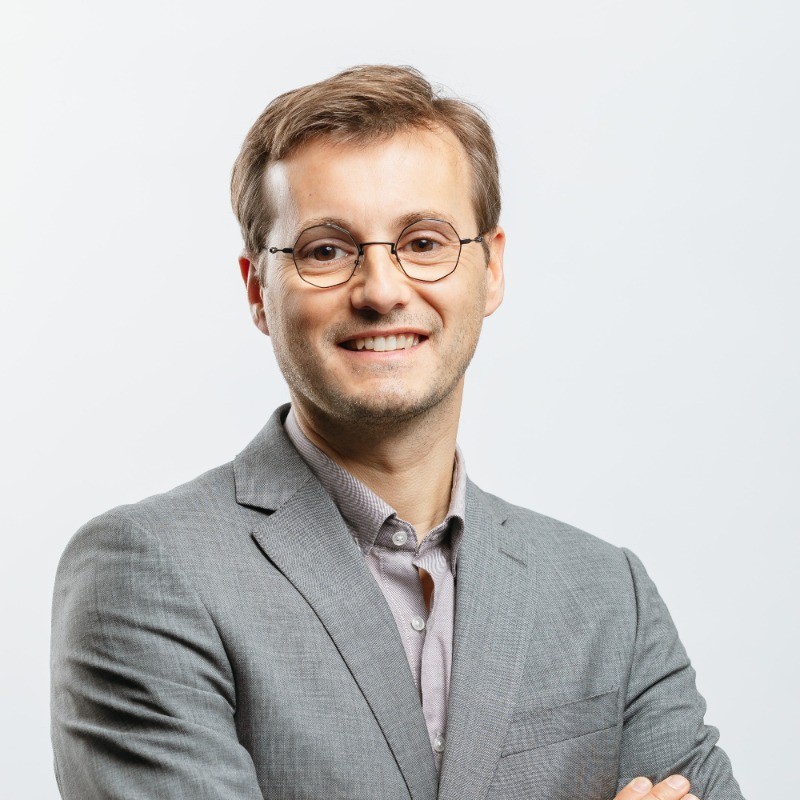
Luís Tiago Ferreira
Responsible for the Smart Cities, Public Lighting, and Open Data, E-REDES
Biography
With more than 20 years of experience, including the support office to the General and Supervisory Board of EDP, Regulation and Energy Policy, strategic consulting, and network engineering. Graduated in Electrical and Computer Engineering from Instituto Superior Técnico.
Local: Room B018
Date: Tuesday, July 1st, 2025 | 09h00
Energy Transition through Sustainable Systems – WinPower’s Sines PTx Hydrogen Project
This presentation explores WinPower’s PtX Sines project, a large-scale green hydrogen initiative located in Portugal. The session will cover the project’s development timeline, its integration with local renewable energy sources, and its role in the national hydrogen infrastructure. It will also highlight WinPower’s collaborative approach with industry leaders to overcome technical and economic barriers. The presentation is part of the broader theme “Energy Transition through Sustainable Systems.
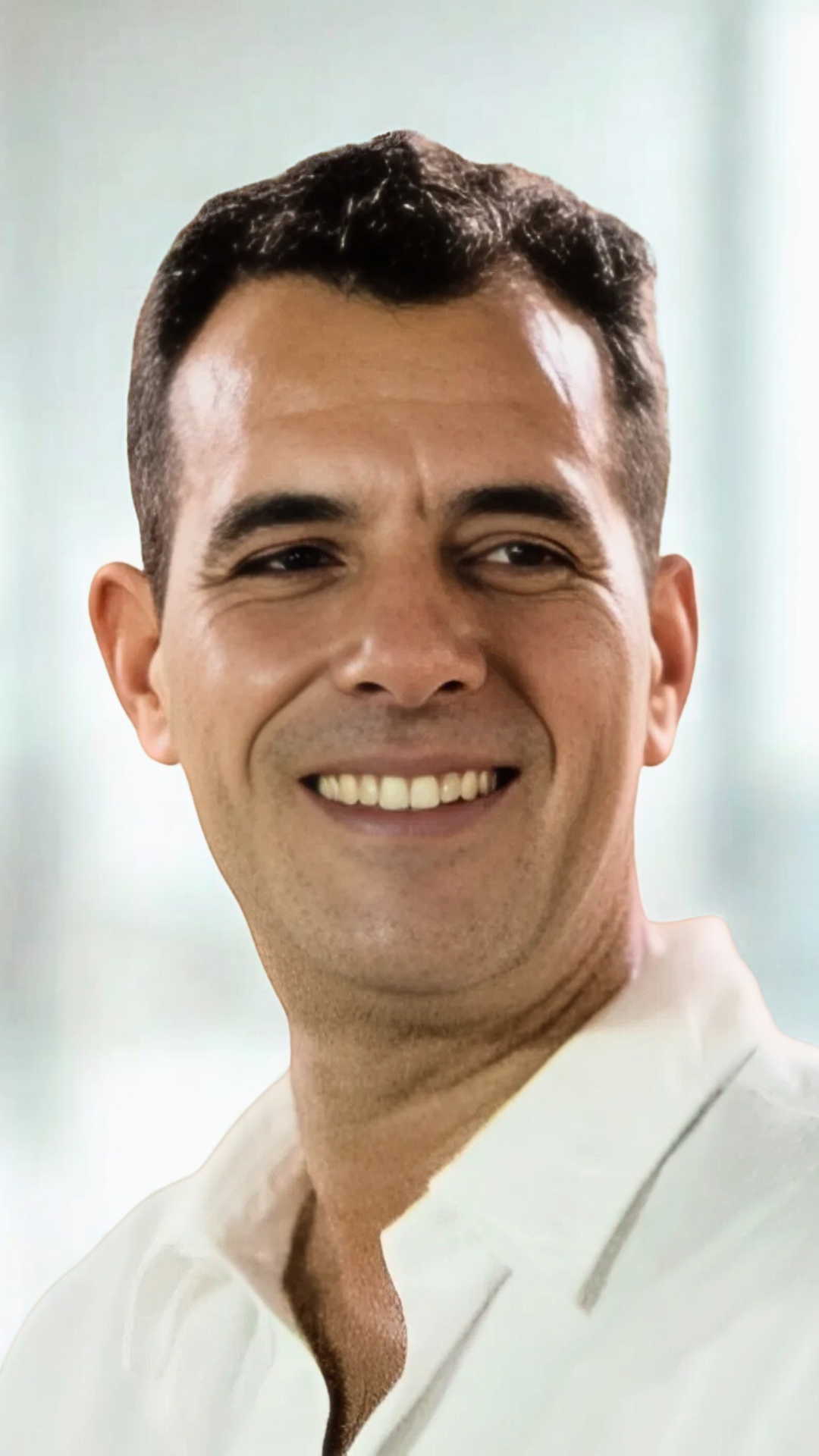
João Camões
Head of Hydrogen Business Unit, WinPower
Biography
João Camões is Head of the Hydrogen Business Unit at WinPower, where he focuses on developing viable green hydrogen solutions for the energy transition. He holds a Mechanical Engineering degree from IST and an Executive MBA from AESE/IESE. With over 25 years of experience, he has led energy projects across Europe, Latin America and Africa. His career spans hydrogen, renewables, industrial systems, and large-scale infrastructure.
Local: Room B018
Date: Tuesday, July 1st, 2025 | 11h00
Data-driven energy services – energy company perspective
The energy sector is shifting to renewables and decentralized systems, demanding smarter solutions to manage its complexity. Technologies like smart grids and AI powered energy management systems have the ability to increase efficiency and stability of the whole system. Elergone Energia has been working in new energy services where the end user plays a more active role, creating a more sustainable and value-driven energy ecosystem.
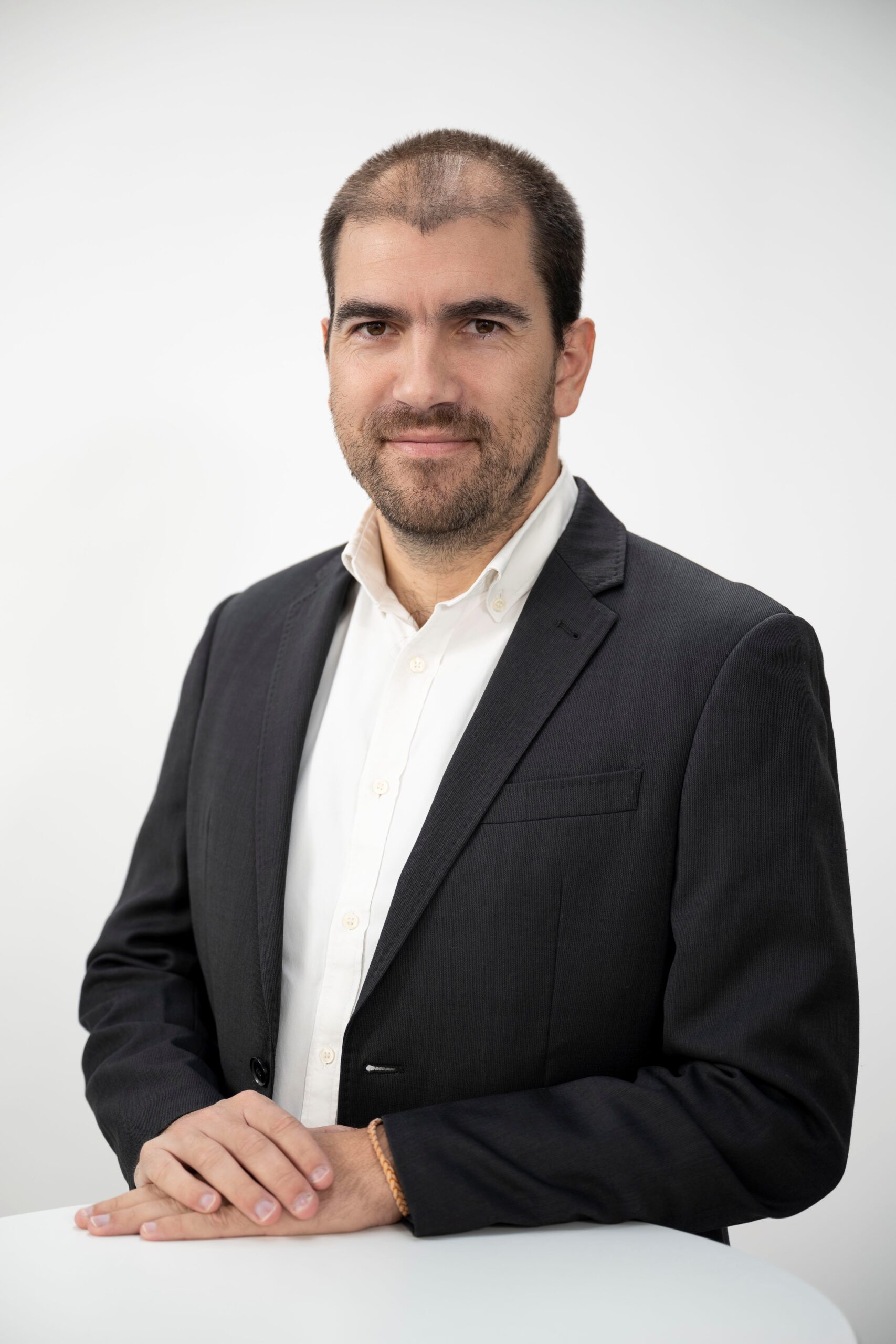
Amândio Ferreira
Innovation Area Coordinator, Elergone
Biography
Amândio Ferreira is the Innovation Area Coordinator at Elergone Energia, where he leads the Innovation & Digital team and coordinates R&D projects focused on renewable energy, energy storage, smart buildings, e-mobility, and flexibility services. He defines and implements the company’s R&D strategy, ensuring alignment with corporate objectives, and in close collaboration with Sonae MC as well as other internal teams. With over 15 years of experience in the renewable energy sector, Amândio previously held several roles at INEGI, including leading the setup of INEGI Turkey Renewables. His work covered technical due diligence, energy yield assessments, and digitalization initiatives. He holds a Master’s Degree in Mechanical Engineering – Advanced Energetic Technologies from the University of Porto and has international training from UC Berkeley.
Local: Room B018
Date: Tuesday, July 1st, 2025 | 11h25
Towards Transparent Data-Driven Decision and Control Systems in Power Systems
The transition to renewable energy systems introduces challenges such as low inertia, fluctuating generation, and high distributed energy resource (DER) integration, increasing operational complexity in control rooms. Grid-forming (GFM) control offers stability benefits but remains underused. Traditional model-based dynamic security assessment (DSA) struggles with the complexity of large state-space models, requiring data-driven approaches. However, the black-box nature of AI methods limits their adoption. This work presents the Evolving Symbolic Model (ESM), an interpretable framework for DSA and control design. ESM enables system security classification, real-time preventive actions, and optimal GFM primary control loop design. By improving interpretability, ESM enhances decision-support systems, unlocking the full potential of AI-driven control in modern power systems.
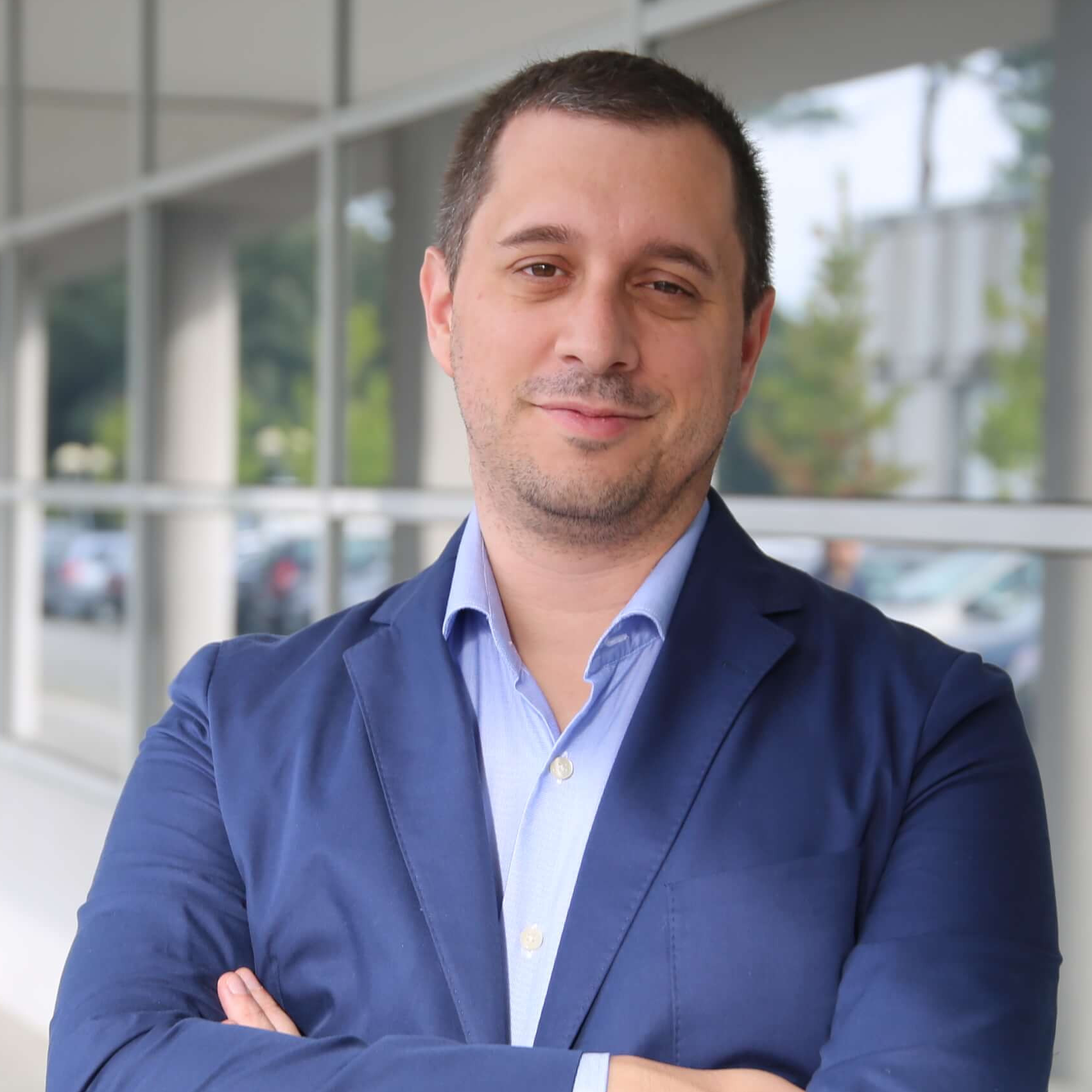
Ricardo Bessa
Coordinator of the Center for Power and Energy Systems, INESC TEC
Biography
Ricardo Bessa, IEEE Senior Member, earned his 5-years in Electrical and Computer Engineering (2006), M.Sc. in Data Analysis (2008), and Ph.D. in Sustainable Energy Systems (2013) from the University of Porto. He coordinates the Center for Power and Energy Systems at INESC TEC. His research spans energy forecasting, computational intelligence, and smart grids. He led projects like AI4REALNET and contributed to FP6 ANEMOS.plus, H2020 Smart4RES and H2020 InteGrid. Received the ESIG Excellence Award (2022) and is an Associate Editor for the Journal of Modern Power Systems and Clean Energy.
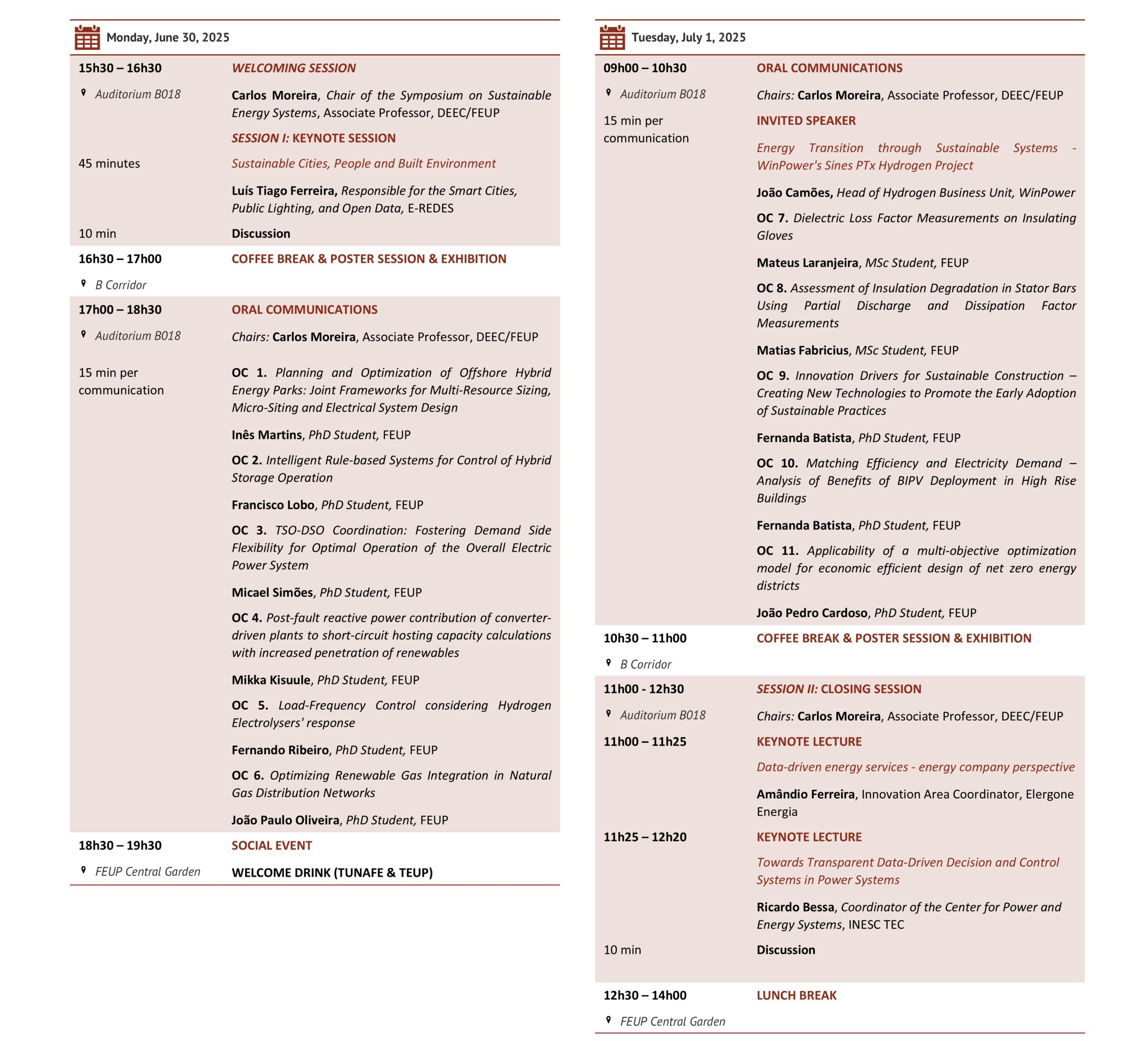
The Symposium Organizing Committee is pleased to invite everyone interested in expanding and sharing their knowledge and expertise in the field of electrical or mechanical engineering, with a focus on sustainable energy systems, to submit their work. This invitation is open to PhD and MSc students, as well as other researchers and professionals in this field.
To take advantage of this opportunity, the symposium invites abstract submissions on topics relevant to the fields of Energy and Sustainability, including, but not limited to:
- Energy Planning, Market Regulation and Environmental Policies
This section consolidates research topics that contribute to creating sustainable societies through energy use, including energy planning, modeling, analysis, and design. It also highlights proposed improvements in energy policies related to energy efficiency, renewable energy, greenhouse gas emissions, and climate change. Furthermore, it examines energy markets, regulation, and sustainable development—three critical areas for advancing reliable, affordable, clean, and integrated energy systems in the future.
- Sustainable Cities, People and Built Environment
The concept of sustainable cities is centered around the efficient use of available resources, particularly energy. Urban communities depend on the built environment for shelter and comfort, which makes it important to focus on research topics such as sustainable building rehabilitation in urban areas, microgeneration of renewable energy, and urban metabolism. These areas of knowledge are crucial for developing innovative solutions and identifying potential improvements, taking into account the diverse sociodemographic and geographical characteristics of each region.
- Electric power grids for a decarbonized economy
Decarbonizing the economy is a crucial step in addressing climate change. This shift requires a significant transformation of the electricity system, with the large-scale integration of non-dispatchable renewable energy sources, promoting sector coupling, and widespread adoption of high-energy efficiency technologies on the demand side across residential, commercial, and industrial sectors. Key research areas include:
- Operation and control of converter-dominated electric power grids;
- Innovative efforts to monitor, manage and control the currently changing power grids;
- Renewable energy generation, energy storage and end-user approaches;
- Information technology and “big data” applications for enhancing the performance of energy networks in smart grids;
- Smart mobility and energy demand technologies;
- Multi-energy networks and renewable gases.
This Symposium is organized by PhD students of the Doctoral Program in Sustainable Energy Systems at FEUP, with the support of the Associate Laboratory INESC TEC.

Submissions
Format: Oral or poster communications
Please follow the abstract template (maximum 1 page) according to the Instruction for Authors available under the Registration page. The submission must be done through the SCI-MEET platform.
For more information, please click HERE.
Registration & Payment
Registration is mandatory for all participants through the SCI-MEET platform.
The Doctoral Program in Sustainable Energy Systems (PDSSE) will cover the registration costs for FEUP’s PDSSE students and professors, who register in the scope of the ‘Early Bird Registration’ deadline.
A limited number of ‘Early Bird Registration’ waivers will be granted to other students, researchers or professors from FEUP, depending on the number of attendees. For any questions, please email up202102681@fe.up.pt (Francisco Lobo).
Abstracts will be included in the Book of Abstracts only if at least one author of each accepted abstract is registered and has paid the registration fee (attended the event).
Please note that at least one author per submitted abstract (oral or poster communication) must register for the Congress as soon as possible to secure participation.
Program
|| The full program will be available soon ||
Communications
Oral communication:
- Prepare a PowerPoint presentation to support your talk.
- An editable PowerPoint template will be available soon.
- Language: Presentations and slides must be in English.
Poster communication:
- The poster exhibition will be held in FEUP’s B Corridor, where posters will be displayed on the corridor windows.
- Posters should be formatted in portrait mode, size A1 (841 mm height × 594 mm width).
- Language: Posters must be in English.
- An editable poster template will be available soon.
Publications
All accepted abstracts, with at least one author registered in the Congress with a paid fee, will be included in the event’s program and the Symposium Book of Abstracts.
|| The Book of Abstracts will be available soon ||
Awards
Authors of accepted abstracts presented at the Congress will be eligible for the Best Oral and Best Poster Communication Awards.
Symposium Committees
Symposium Chairs:
- Carlos Coelho Leal Monteiro Moreira, FEUP
- João Abel Peças Lopes, FEUP
Symposium Organizing Committee:
- Carlos Coelho Leal Monteiro Moreira, FEUP
- Célia Natividade de Vasconcelos Couto, FEUP
- João Abel Peças Lopes, FEUP
- João Paulo Tomé Saraiva, FEUP
- Tiago André Teixeira Soares, FEUP
- Vítor Manuel da Silva Leal, FEUP
- Zenaida Sobral Mourão, FEUP/INESC TEC
- Abdelrahman Muneer Mohammed Abdelrahman Elhawash, PhD Student PDSSE, FEUP
- Carlos Alberto Madureira da Silva, PhD Student PDSSE, FEUP
- Felipe Dantas do Carmo, PhD Student PDSSE, FEUP
- Fernando José Moutinho Ribeiro, PhD Student PDSSE, FEUP
- Francisco Sousa Fernandes, PhD Student PDSSE, FEUP
- Francisco Sousa Lobo, PhD Student PDSSE, FEUP
- João Carlos Agrela Freitas, PhD Student PDSSE, FEUP
- Sofia Varotto, PhD Student PDSSE, FEUP
Symposium Scientific Committee:
- Carlos Coelho Leal Monteiro Moreira, FEUP
- João Abel Peças Lopes, FEUP
- João Paulo Tomé Saraiva, FEUP
- Ricardo Jorge Gomes de Sousa Bento Bessa, FEUP/INESC TEC
- Tiago André Teixeira Soares, FEUP
- Vítor Manuel da Silva Leal, FEUP
- Zenaida Sobral Mourão, FEUP/INESC TEC
Contact: up202102681@fe.up.pt (Francisco Lobo)
